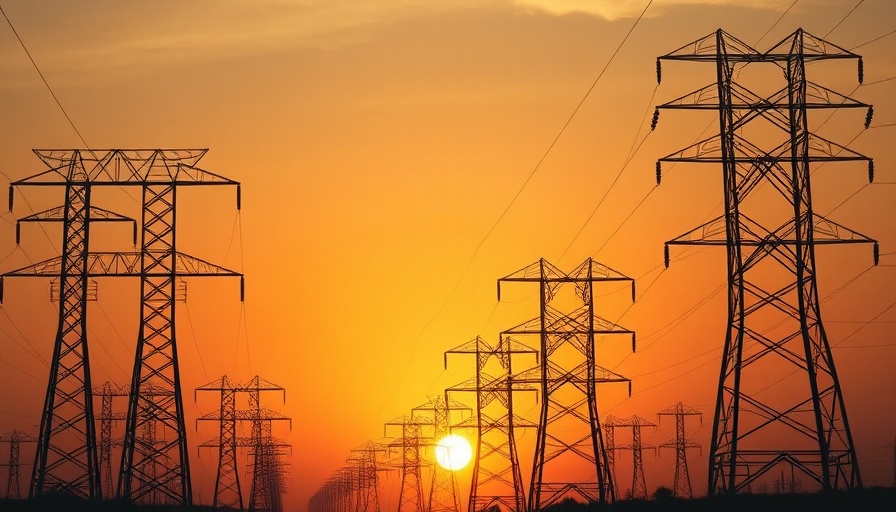
Understanding the Future of the Power Grid with AI
The power grid—a vital backbone of modern society—faces an unprecedented challenge. As demand for energy surges and renewables become increasingly mainstream, traditional energy infrastructures are showing signs of strain. However, advancements in artificial intelligence (AI) offer a glimmer of hope, dramatically changing how we approach power generation and distribution. This article explores how AI supercharges the power grid, the implications for businesses, and a glance at emerging technologies from China that may alter the landscape further.
AI: The Key to a Resilient Power Grid
AI technologies are intelligently reshaping the power grid by facilitating smarter energy management. Climate change-induced weather patterns are wreaking havoc on already-crumbling infrastructures, leading utilities across the globe to seek solutions. According to SAP’s insights, the integration of AI enhances the grid's operational capabilities significantly, enabling it to balance demand and supply more effectively. These technologies offer not just immediate solutions but also pave the way for a future where energy is both flexible and sustainable.
Rethinking Energy Sources: The Role of Prosumers
As the concept of 'prosumer' gains traction, the dynamics of energy generation are shifting. Prosumers, or consumers who both produce and consume energy, are challenging traditional power distribution models. By leveraging solar panels and battery technology, they contribute to a more decentralized power grid. The implications for businesses are profound: increasing reliance on renewables could reduce costs and carbon footprints while promoting sustainability. As reported by MIT Technology Review, this decentralization also highlights the importance of tailored energy management solutions.
Fast Decision-Making: How AI Streamlines Grid Management
The complexity of today’s power grids cannot be overstated. The infusion of AI is helping streamline processes that were once cumbersome and time-consuming. AI can analyze mountains of data, learning from historical patterns to make real-time decisions. For example, researchers at Argonne National Laboratory have developed a machine-learning model that can predict daily energy needs, optimizing dispatch operations from nearly 10 minutes to a mere 60 seconds. Such speed and accuracy can significantly enhance grid reliability.
Emerging Innovations from China: The New AI Agent
Amid ongoing advancements, new players are emerging on the global energy stage. China's foray into AI-powered grid management technology is noteworthy, particularly with its recent development of an AI agent designed to optimize energy distribution. This innovation underscores the global competition for energy solutions and reflects a rapidly evolving landscape. With such advancements, businesses must be cognizant of evolving technologies and practices from abroad to remain competitive.
Challenges on the Horizon: Security and Data Privacy
As AI reshapes the energy sector, it is crucial to address potential risks. Cybersecurity remains a paramount concern, with sophisticated attacks increasingly targeting the energy infrastructure. Experts recommend robust security protocols and systems to safeguard against threats while ensuring data privacy. Additionally, biases in AI algorithms could perpetuate inequalities, particularly affecting vulnerable communities during outages. Addressing these challenges is paramount for a sustainable future.
Opportunities for Businesses: Embrace AI and Renewable Energy
The intersection of AI and renewable energy presents numerous opportunities for businesses. By adopting smart technologies that utilize AI, companies can optimize their energy use while reducing costs. Furthermore, the transition to a more flexible energy grid can enhance competitiveness and sustainability in an era where eco-conscious consumers are increasingly influential. Utilities are starting to leverage AI tools that anticipate energy needs and optimize production based on consumer behavior, ensuring they stay ahead of the curve.
The Future is Bright: Insights for Business Leaders
As we move towards a smarter grid, business leaders must consider how these advancements will impact their operations. Staying informed about emerging technologies from both local and international sources is crucial. Companies should invest in AI-integrated solutions and sustainable practices to not only optimize their energy consumption but to align with global trends toward sustainability and innovation.
In conclusion, the integration of AI into energy management promises to revolutionize the power grid, making it more resilient, efficient, and adaptive to change. As we look ahead, businesses must adapt to these technological shifts, embracing the smart solutions that will drive future growth.
For further insights on how AI and renewables can transform your business operations, consider engaging with thought leaders in the energy sector and exploring partnerships with technology providers that specialize in smart grid solutions.
 Add Row
Add Row  Add Element
Add Element 


 Add Row
Add Row  Add
Add 

Write A Comment